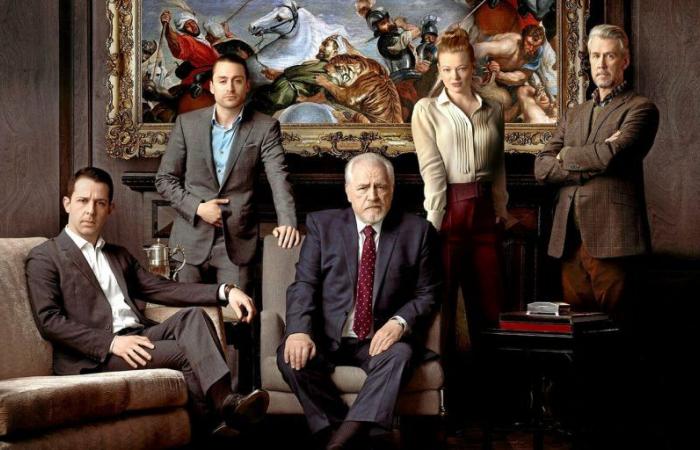Falmost ample and acidic, rightly rewarded with 14 Emmy Awards, 9 Golden Globes and 8 Critic Choices, Succession takes pride of place in the Pantheon of the best series of all time. Behind the insults that fly, the retorts that snap, the shoulder-to-shoulder camera movements, the secret maneuvers, the rivalries and the low blows unfolds a subtext of incredible density.
The work of showrunner Jesse Armstrong examines Trumpist American society with incredible acuity and manages to draw up a worrying map of a country sick of its excesses. At the heart of his story, the Roy clan: a dysfunctional family of billionaires who compete for the head of a media empire called Waystar Royco. A line-up of detestable anti-heroes, to which we nevertheless grew attached over the course of the four seasons of the series – which ended on May 28, 2023 on HBO.
This is the whole success of Succession : manage to talk about us as a society and individuals while documenting the opaque and inaccessible world of the 0.001%, these ultra-rich who make and break the global economy. And it is this wonderful subject that interested Ariane Nicolas, journalist at Philosophy Magazine. In its exciting Succession, violence in inheritance (released September 24, 2024), the author dissects the work through the prism of the brutality which irrigates society and interpersonal relationships, what she says about the decay of American democracy, of the time – without mercy – and how it shapes and damages the members of the Roy clan. All by summoning Thomas Hobbes, Napoleon, Jean-Jacques Rousseau and even William Shakespeare.
The best and worst of America
« Succession is one of the greatest series of all time,” says Ariane Nicolas. “In any case, it’s the one that upset me the most. I could feel euphoria, sadness, doubts. And it made me think about society, but also about myself. There we find ambivalences and crisis situations that we have all experienced – in smaller proportions, obviously. And it allows us to observe our balance of power and the way in which violence circulates at all levels of society, without it sparing anyone,” she explains to us.
Because it is Succession sees itself as a fierce satire of the business world, creator Jesse Armstrong also provides “a fine analysis of contemporary Western societies, convinced of being on the path to pacification and contained civility while they are still plagued by violence, whether political, economic, domestic, verbal, sexual or psychological,” as Ariane Nicolas writes. This charge is aimed primarily at the United States.
And the showrunner tackles it right and hard. “Jesse Armstrong reminds us through the voice of Swedish billionaire CEO Lukas Matsson: the United States has only been a real democracy, with equal rights for all its citizens, since the civil rights movement in the 1960s,” underlines the author. “It’s a crazy country, in constant change, both extraordinary but also detestable, where we observe a lot of violence and a very strong anti-feminist, anti-Semitic and racist ebb. Successionas The Wire, Les Sopranos, Mad Men, Veep or even Game of Thronestells us all this, these possibilities, these best and these worst. »
Jeremy Strong, prodigious interpreter of Kendall Roy
Indeed, if Succession evolves on a tragicomic crest line, its inventory (not to mention its masterful conclusion) is thus far from being cheerful. The old world resists, the conservative backlash threatens and the patriarchal system continues to bring women into line, no matter how talented and ambitious they may be. Thus, among the characters in the series that Ariane Nicolas very accurately deciphers in her work, we find Shiv, the only girl of the siblings.
“I’m quite hard on Shiv because I think she has a choice and enjoys a certain freedom,” comments the journalist. “Certainly, it is trying to modernize the model it inherited. To caricature: she decided to be the guy in her relationship. Shiv is powerful, she cheats on her husband, she cuts people off, she’s the only one who doesn’t suffer from imposter syndrome. But she needs her partner, Tom, to be considered legitimate in her father’s eyes. She wants to emancipate herself but comes up against this sad reality: society remains fundamentally misogynistic. And in the end, she is brought back to her biological condition as a woman who can bear children. »
The #MeToo revolution? Swept away. As for masculinity, it is toxic here, of course, but also often prevented, weakened. At the crossroads of these existential moods, we find in particular the character of Kendall, the youngest son. “Perhaps the most beautiful series character ever created,” according to Ariane Nicolas, who loved dissecting the torments of this heartbreaking loser.
“Kendall is full of contradictions, this makes him a complex and ultimately very realistic human being,” explains the author. “He can’t be completely himself, out of loyalty to his father, who he thinks he should be like. This is his Shakespearean side: he doesn’t know what to do with power. He knows that he will have to betray to reach the top, but is consumed by ethical dilemmas. And besides, the actor, Jeremy Strong, is prodigious. I don’t think there are many characters who have so many nuances, so much scope and who are so touching. »
Navigating between psychological, political, linguistic and sociological studies, Succession, violence in inheritance delivers a detailed analysis of this merciless family saga. And makes us want to dive back into its 39 episodes to (re)capture all the richness.
Succession, violence in inheritance, by Ariane Nicolas. Edition Playlist Society 180 pages






